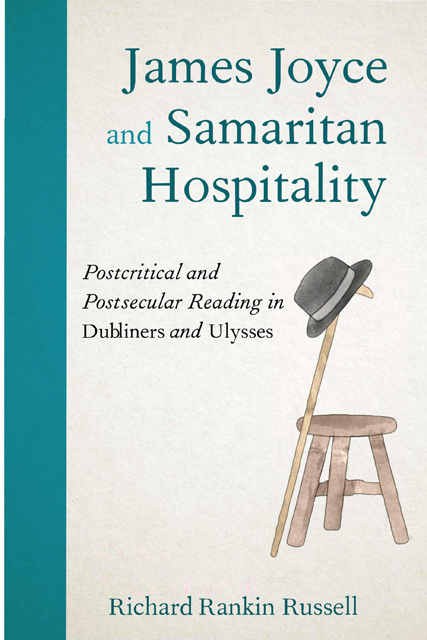Book contents
- Frontmatter
- Contents
- Preface and Acknowledgments
- List of Abbreviations
- Introduction
- 1 Haunted by Hospitality in “The Dead”
- 2 Joyce, Scripture, and Autobiographical Rescue Narratives
- 3 Rewriting the Good Samaritan Parable: The Fictional Rescue Narratives of “Grace” and “Circe”
- 4 Bloom as Stranger and Samaritan in “Cyclops,” “Oxen of the Sun,” and “Circe”
- 5 “In orthodox Samaritan fashion”: The Parabolic Encounter between Stephen and Bloom in “Eumaeus”
- 6 Home to “Ithaca” and “Penelope”: Bloom’s Hospitality and Stephen and Molly’s Reactions
- 7 Enfleshed Ethics and the Responsibility of the Reader in the Good Samaritan Parable and the “Nostos” of Ulysses
- Coda: “Go thou and do likewise”: Postcritical and Postsecular Reading through a Joycean Hermeneutics of Hospitality
- Works Cited
- Index
5 - “In orthodox Samaritan fashion”: The Parabolic Encounter between Stephen and Bloom in “Eumaeus”
Published online by Cambridge University Press: 25 April 2023
- Frontmatter
- Contents
- Preface and Acknowledgments
- List of Abbreviations
- Introduction
- 1 Haunted by Hospitality in “The Dead”
- 2 Joyce, Scripture, and Autobiographical Rescue Narratives
- 3 Rewriting the Good Samaritan Parable: The Fictional Rescue Narratives of “Grace” and “Circe”
- 4 Bloom as Stranger and Samaritan in “Cyclops,” “Oxen of the Sun,” and “Circe”
- 5 “In orthodox Samaritan fashion”: The Parabolic Encounter between Stephen and Bloom in “Eumaeus”
- 6 Home to “Ithaca” and “Penelope”: Bloom’s Hospitality and Stephen and Molly’s Reactions
- 7 Enfleshed Ethics and the Responsibility of the Reader in the Good Samaritan Parable and the “Nostos” of Ulysses
- Coda: “Go thou and do likewise”: Postcritical and Postsecular Reading through a Joycean Hermeneutics of Hospitality
- Works Cited
- Index
Summary
All that he [Bloom] does is to hover round him [Stephen] for three or four hours, look after his money, bore him with banal advice, serve him with Epps’ cocoa, and invite him to stay the night on an improvised bed. When they take leave of each other we feel certain that they will never meet again. And yet in a measure that no spectacular action could have achieved, we are led from the things done, felt and said to the contemplation of a mystery.
Frank Budgen, James Joyce and the Making of Ulysses, 287Textual Considerations of “Eumaeus”
At the beginning of the “Eumaeus” episode of Ulysses, still the most understudied episode in the novel, the narrator describes Leopold Bloom’s actions toward Stephen Dedalus, who has been punched by Private Carr in “Circe”: “Preparatory to anything else Mr Bloom brushed off the greater bulk of the shavings and handed Stephen the hat and ashplant and bucked him up generally in orthodox Samaritan fashion which he very badly needed” (U 16.1–3; my emphasis). Given Hugh Kenner’s argument that the language of “brushed,” “shavings,” and “bucked” here returns us to the opening scene of the novel where Buck Mulligan lathers his face and shaves, the new context for this language—Bloom’s helping of Stephen—suggests that here, instead of a usurper, a false friend, Joyce now offers Stephen a rescuer, a true friend. Joyce thus rein-scribes the Good Samaritan parable in “Circe,” “Eumaeus,” “Ithaca,” and even in “Penelope.” But he is also rewriting the first episode, as it were, and bringing Stephen full circle from Buck’s attacks on him at 8:00 that morning to Bloom’s midnight rescue of him after Private Carr attacks him in “Circe.”
There are three other references to the parable in the novel that antedate the reference to it in “Eumaeus.” Besides Bloom’s pondering of the question, “Who is my neighbor?”, in “Lotus Eaters” (5.341), in “Oxen of the Sun”, Stephen thinks of the last words of Christ in the parable in the context of a perverted sexual twist on John 15:13: “Greater love than this … no man hath that a man lay down his wife for his friend” (U 14.360–2).
- Type
- Chapter
- Information
- James Joyce and Samaritan HospitalityPostcritical and Postsecular Reading in Dubliners and Ulysses, pp. 122 - 159Publisher: Edinburgh University PressPrint publication year: 2023



